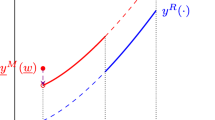Abstract
The division problem consists of allocating a given amount of a homogeneous and perfectly divisible good among a group of agents with single-peaked preferences on the set of their potential shares. A rule proposes a vector of shares for each division problem. The literature has implicitly assumed that agents will find acceptable any share they are assigned to. In this article we consider the division problem when agents’ participation is voluntary. Each agent has an idiosyncratic interval of acceptable shares where his preferences are single-peaked. A rule has to propose to each agent either to not participate or an acceptable share because otherwise he would opt out and this would require to reassign some of the remaining agents’ shares. We study a subclass of efficient and consistent rules and characterize extensions of the uniform rule that deal explicitly with agents’ voluntary participation.
Similar content being viewed by others
References
Barberà S (1996) Notes on strategy-proof social choice functions. In: Arrow K, Sen AA, Suzumura K (eds) Social choice re-examinated. MacMillan, London (1996). French version: Sur les fonctions de choix non manipulables. Revue d’Économie Politique 106:61–81 (1996)
Barberà S (2001) An Introduction to Strategy-proof Social Choice Functions. Soc Choice Welf 18: 619–653
Barberà S (2010) Strategy-proof Social Choice. In: Arrow K, Suzumura K (eds) Handbook of social choice and welfare, vol 2. Kluwer, Dordrecht
Barberà S, Jackson M, Neme A (1997) Strategy-proof allotment rules. Games Econ Behav 18: 1–21
Cantala D (2004) Choosing the level of a public good when agents have an outside option. Soc Choice Welf 22: 491–514
Ching S (1992) A Simple characterization of the uniform rule. Econ Lett 40: 57–60
Ching S (1994) An alternative characterization of the uniform rule. Soc Choice Welf 11: 131–136
Ching S, Serizawa S (1998) A maximal domain for the existence of strategy-proof rules. J Econ Theory 78: 157–166
Chun Y, Thomson W (1990) Egalitarian solutions and uncertain disagreement points. Econ Lett 33: 29–33
Dagan N (1996) A note on Thomson’s characterizations of the uniform rule. J Econ Theory 69: 255–261
Herrero C, Villar A (2000) An alternative characterization of the equal-distance Rule for allocation problems with single-peaked preferences. Econ Lett 66: 311–317
Jackson M (2001) A crash course in implementation theory. Soc Choice Welf 18: 655–708
Schummer J, Thomson W (1997) Two derivations of the uniform rule and an application to bankruptcy. Econ Lett 55: 333–337
Sprumont Y (1991) The division problem with single-peaked preferences: a characterization of the uniform allocation rule. Econometrica 59: 509–519
Sprumont Y (1995) Strategy-proof collective choice in economic and political environments. Can J Econ 28: 68–107
Sönmez T (1994) Consistency, monotonicity, and the uniform rule. Econ Lett 46: 229–235
Thomson W (1994a) Consistent solutions to the problem of fair division when preferences are single-peaked. J Econ Theory 63: 219–245
Thomson W (1994b) Resource-monotonic solutions to the problem of fair division when preferences are single-peaked. Soc Choice Welf 11: 205–223
Thomson W (1995) Population monotonic solutions to the problem of fair division when preferences are single-peaked. Econ Theory 5: 229–246
Thomson W (1996) Concepts of implementation. Jpn Econ Rev 47: 133–143
Thomson W (1997) The replacement principle in economies with single-peaked preferences. J Econ Theory 76: 145–168
Weymark J (1999) Sprumont’s characterization of the uniform rule when all single-peaked preferences are admissible. Rev Econ Des 4: 389–393
Author information
Authors and Affiliations
Corresponding author
Rights and permissions
About this article
Cite this article
Bergantiños, G., Massó, J. & Neme, A. The division problem with voluntary participation. Soc Choice Welf 38, 371–406 (2012). https://doi.org/10.1007/s00355-011-0530-9
Received:
Accepted:
Published:
Issue Date:
DOI: https://doi.org/10.1007/s00355-011-0530-9




